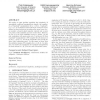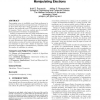11 search results - page 1 / 3 » Complexity of Manipulating Elections with Few Candidates |
107
click to vote
CORR
2002
Springer
15 years 13 days ago
2002
Springer
In multiagent settings where the agents have different preferences, preference aggregation is a central issue. Voting is a general method for preference aggregation, but seminal r...
127
click to vote
CORR
2012
Springer
13 years 8 months ago
2012
Springer
All previous work on “candidate-control” manipulation of elections has been in the model of full-information, simultaneous voting. This is a problem, since in quite a few real...
96
Voted
ATAL
2010
Springer
15 years 1 months ago
2010
Springer
We resolve an open problem regarding the complexity of unweighted coalitional manipulation, namely, the complexity of Copeland -manipulation for {0, 1}. Copeland , 0 1, is an...
122
Voted
CATS
2007
15 years 2 months ago
2007
We study the manipulation of voting schemes, where a voter lies about their preferences in the hope of improving the election’s outcome. All voting schemes are potentially manip...
106
Voted
ATAL
2006
Springer
15 years 4 months ago
2006
Springer
Encouraging voters to truthfully reveal their preferences in an election has long been an important issue. Previous studies have shown that some voting protocols are hard to manip...


